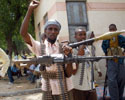
U.S. policymakers would do well to take note of the latest report from Amnesty International which outlines the serious civilian consequences that may result from indelicate military assistance to Somalia. The group warned last week that despite the steady flow of internationally-supplied arms to Somalia this past year, disturbingly few safeguards are in place to ensure that those weapons are not being used for war crimes and serious violations of international humanitarian law.
The “lack of international human rights standards and effective accountability” surrounding assistance to the Somali government, or TFG, risks exacerbating the broiling conflict. The report said:
“…[D]onors’ concern for the viability of the TFG and the security of international shipping has not been matched by equal attention to the human rights of the Somali people and the protection of civilians in the continuing armed conflict.”
Though Ethiopia, Yemen, and Uganda number as the most egregious international actors when it comes to supplying weapons, U.S. assistance to Somalia is also a cause for concern. In particular, U.N. monitors have been unable to trace the path of U.S.-supplied arms, or to detect whether any of the weaponry has been diverted to other armed groups, because of the lack of detail the U.S. government provides.
This difficulty tracing would not be so alarming if the Somali government didn’t have problems in the past controlling equipment leakages. In a 2008 report, U.N. monitors documented the diversion of internationally-supplied weapons and military equipment from the TFG to armed opposition groups—the very ones that the Somali government is fighting.
Amnesty also documents U.S. plans to supply up to $2 million to the Somali government for the purchase of military supplies “locally,” a move that that risks supporting Somalia’s domestic arms trade:
“…[T]he funding of purchases from domestic arms traders will help to support Mogadishu’s flourishing, uncontrolled domestic arms markets: the same markets that are reportedly a major source of weaponry for al-Shabaab and other armed groups opposed to the TFG, and themselves accused of committing war crimes and other serious human rights abuses."
This lack of transparency also extends to international assistance in military and police training, where the selection of trainees, trainers, and even what practices the Somali forces are trained in, may be problematic when held to international human rights standards.
The risk that foreign assistance may ultimately prolong the violence in Somalia is a serious charge that international donors must heed. Without establishing the proper mechanisms to monitor where and how military assistance is used, the international community will certainly be failing the most important group of actors concerned — the Somali civilians caught in the crossfire.
Photo: Anti-government fighter in Mogadishu (AP)

